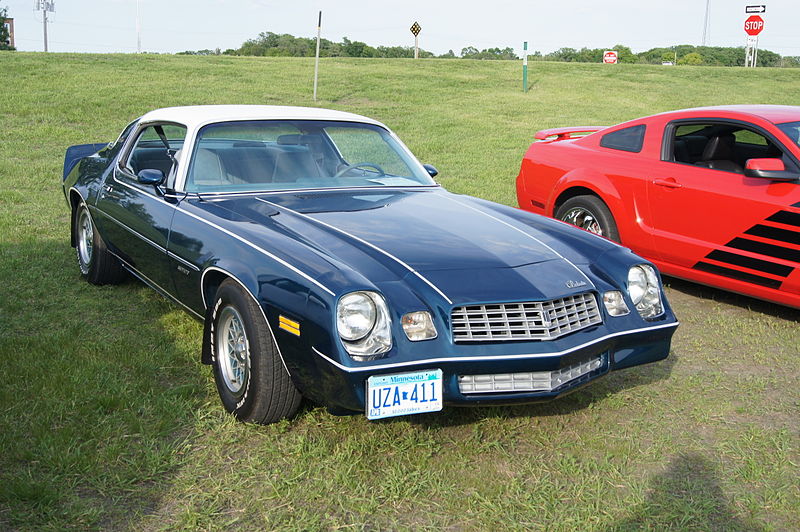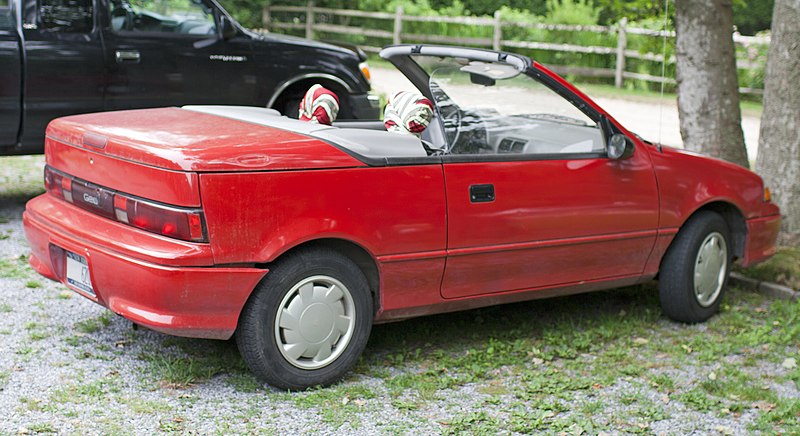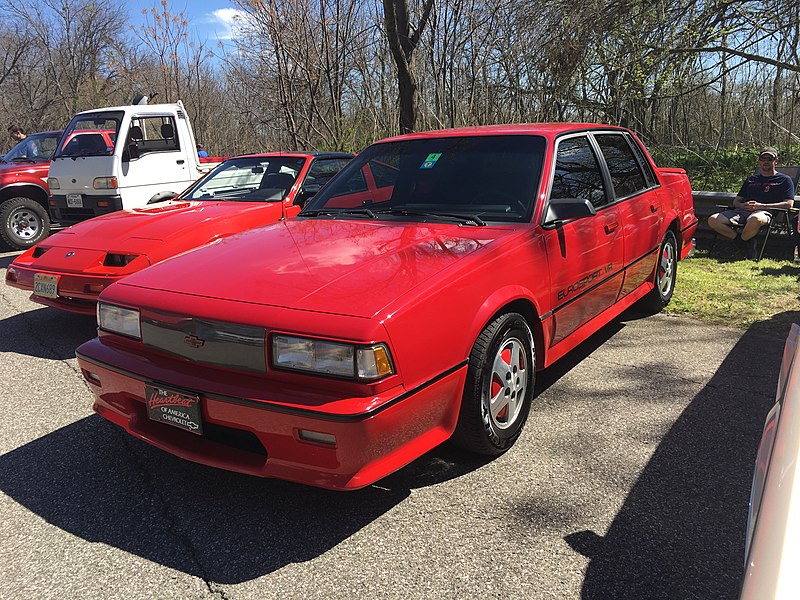To get a home run you have to swing for the fences, but not everything can be a big hit. GMC is a defining brand in the American car industry and Chevrolet especially has endured for decades, putting out both icons like the Impala and gamechangers like the Corvette. Big swings can mean big losses, though, and we’re going to look at 25 models that seriously missed the mark.
25. Chevrolet Uplander
GM could never quite get a handle on the minivan. They hoped that the Uplander would hit the market as a “manlier” version of the family vehicle, which was already associated with suburban parenthood and the soccer mom. They ended up with a stubby pickup’s nose on a blocky, awkward and cheap body. GM quietly exited the minivan market within a few years.
24. Chevrolet Monte Carlo Z34
This unimaginative and disappointing release was little more than a two-door Lumina with a boring engine and cheap interior. GM had already started to pivot to larger passenger vehicles and apparently couldn’t be bothered with a redesign. Chevy was hoping to ride the nostalgia surrounding the Monte Carlo name, but it ended up backfiring, and customers were let down.
23. Geo Metro Convertible
The name General Motors had brand recognition in the 90s, but with that legacy comes a feeling of age, and GM knew it had to work harder to grab the younger customer market. Thus, the Geo brand was created, to capitalize on buyers looking for something fresh and new. Unfortunately, this particular convertible ended up being horribly unsafe, with no passenger airbag, crash test evidence of severe leg damage, and all the lightness and stability of a golf cart.
22. Chevy Celebrity
These boxy cheap sedans spent more time at the mechanic’s than on the road. It was a massively popular model specifically because of its cheapness – a fast and affordable way to get wheels on the road, if you didn’t care about literally any other reason to have a car. It was ugly, unreliable, and has fortunately started to disappear.
21. Chevy Aveo
After GM gave up on the Metro, they followed it up with another swing at the subcompact car market. It was significantly safer than its predecessor, possibly because the engineering was entirely done by Daewoo – the car is little more than a rebadged Kalos. The Aveo was counting on bright and bubbly colors to draw in the young buyers, and despite its improvements over the Metro, it just wasn’t the success they’d hoped.
19. Chevrolet Camaro Iron Duke
This car is often cited as the world Camaro model of all time. It was designed to appeal to customers concerned about fuel consumption, but laughably tried to squeeze Camaro performance out of a four-cylinder engine. It was lethargic and unreliable on the road, and any savings from fuel consumption were more than eliminated by increased need for servicing.
 Photo via Wheels.ae
Photo via Wheels.ae
18. Chevrolet Camaro Berlinetta
There’s a consistent theme showing up in Chevy’s failures – they are great at identifying what the buying public likes, but terrible at implementing it in their own designs. The Berlinetta is a great example of this: it was a luxury package with major electronics... for the Camaro, a car known for speed and drivability. All the additions weighed the car down, creating a heavy and awkward driving experience that just entirely missed the mark.
 Greg Gjerdingen via Wikicommons
Greg Gjerdingen via Wikicommons
17. Chevrolet Monza
This car was designed to compete directly with the slim and sporty Mustang II – and to be fair, it certainly compared. Both were unsuccessful in their time, underperforming and unreliable. It was a cheap design that probably stayed on the market for longer than it should have.
 Greg Gjerdingen via Wikicommons
Greg Gjerdingen via Wikicommons
16. Chevrolet Lumina APV
People loved to ridicule the sloping windshield and hood of the APV. In fact, it became known for its “dustbuster” design. GM poured a lot of money into developing these vans, hoping to take market share away from Chrysler’s corner. Unfortunately, regardless of any performance ability, their design was so immediately unpleasant that they quickly became a company failure.
15. Chevy Vega
Chevy has always struggled with balancing fuel efficiency with power and performance. The Vega is a perfect example of this – it’s a sleepy-feeling, unexciting drive with a notably cheap design. GM was struggling to find a market identity when they released this model, and it definitely didn’t make anything clearer.
13. Chevrolet Citation
At a certain point you have to wonder if Chevrolet is playing a long joke. Citation is certainly an appropriate name, because this car deserves one. It's astounding how disappointing this vehicle was. Chevy reused the same engine as the notoriously disappointing Iron Duke, and despite targeting younger buyers with a cheap ticket price, it almost immediately disappeared from the market as a failure.
12. Chevrolet Nova (Corolla)
For a while, GM and Toyota had a partnership to develop vehicles together. The Chevy Nova was based on Toyota’s successful Corolla but didn’t make the best of the collaboration. Unlike the practical Corolla, the Nova came with limited features and a high price tag – association with the famous Nova drag racer couldn’t overcome buyer apathy.
 Greg Gjerdingen via Wikicommons
Greg Gjerdingen via Wikicommons
10. 2000-2005 Chevrolet Monte Carlo
The Monte Carle of the early 2000s were stylish but with little substance. Cheap materials led the vehicles to look dated before their time. Meanwhile, the lack of a V8 in their SS models did little to engage true enthusiasts. The passenger car was slowly fading out of the market and even special editions were little more than visual additions with no real improvements.
8. GM EV1
This is another example of decision-making so bad that it almost feels like GM is pranking us. The EV1 was an early attempt at an electric vehicle from way back in the 90s. With a design straight out of the Jetsons cartoon, it looked dated even then. Even stranger, Chevy made the bizarre decision not to allow this car to be purchased outright. Instead, it was only available to lease. In the end, despite demand from drivers GM ended up reclaiming and crushing all but a few of the vehicles. Shockingly wasteful for a car designed to be environmental, this decision and subsequent outrage ended up being the focus of a recent documentary.
6. Chevy Sprint
The Sprint was a rebadged Suzuki Swift that just never made an impact. It would be reworked into the Metro once GM launched the Geo brand – see earlier in this list for our thoughts about that. While other car companies were designing their own affordable compacts, GM seemed comparatively unconcerned about making any impact on the market at all.
5. 2000 Chevy Impala
The Impala brand is one of the notorious successes of Chevrolet’s entire run, an imprint that seems unforgettable. Which is why it’s so confusing that GM decided to apply the badge to this sedate, bench-seated family sedan. It couldn’t compete with the high design and engineering quality of the Corolla or Accord, which were sweeping the market at the time. Brand loyalty wasn’t enough to get Chevy over this hump.
4. Chevy Caprice Wagon
This boat-like behemoth was one of the largest station wagons on the market in the 90s. Despite distinctions like a reversed third-row seat, it failed to make much of an impression on buyers. The engine delivered Corvette power but the size and weight of the vehicle made it hard to feel any of that in the drive.
2. Chevy Corsica
The Corsica is what you get if you take every car on this list, add them all together, and then average them out. It's design was boring. Worse, it had a cheap build. Overall, an utterly forgettable vehicle. It was almost immediately relegated to rental car fleets and scrapyards. Whatever the exact opposite of iconic is, that’s the Corsica.
1. Cobalt SS
The Cobalt SS is a sad testament to GM’s approach of being on trend, for less. They like to select in-demand car features and implement them for half the budget and zero design philosophy. The Cobalt should have been an affordable hot hatch to compete with the Civic SI and the Neon SRT. Unfortunately, it failed to include anything that made those other cars successful. It was cheaply assembled, prone to failures, and unreliable. An SS trim package does not a sports car make.























